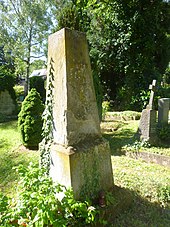Jakob Friedrich Reiff
Jakob Friedrich von Reiff (born December 23, 1810 in Vaihingen an der Enz , † July 6, 1879 in Tübingen ) was a German philosopher .
Life
Reiff attended the Protestant Tübingen monastery from 1828–33 and studied theology (including at the head of the Tübingen school , Ferdinand Christian Baur ) and philosophy . Like David Friedrich Strauss before him , he began his philosophical lectures as a repetiteur at the Tübingen monastery and continued them as a private lecturer at the University of Tübingen since 1840 . In Tübingen he was appointed associate professor in 1844 and full professor in 1855. From 1863 to 1864 he was rector of the University of Tübingen; he retired in 1877. His grave is in the Tübingen city cemetery .
Jakob Friedrich Reiff is the father of the mathematician and physicist Richard Reiff and the two-time father-in-law of the Lindau doctor and honorary citizen Dr. Karl Bever .
philosophy
Reiff initially started from the then dominant philosophy of Hegel , but soon arrived at his own philosophical point of view through a criticism of Hegel's absolute idealism .
In the Hegelian system he criticized on the one hand the logicism, with which no genuinely practical philosophy could be connected, and on the other hand the absolute point of view that disregarded the limits of the finite self. In doing so, he approached the transcendental-critical standpoint of Johann Gottlieb Fichte's theory of science and again gave the primacy of practical reason over the theoretical and the will determinations over the logical categories.
At the same time, Reiff saw a dualism in Hegel's system, which he diagnosed as the cause of the disintegration of the Hegel school into left and right Hegelianism. So Reiff took it as his task to reconcile both tendencies towards disintegration with this dualism in a final synthesis (the last to which German idealism arrived).
Reiff undertook this synthesis from the above-mentioned ethical-critical standpoint, which he combined with the logical achievements of Hegel, in his main work, the 'System of the Determinations of Will' (1842).
Reiff's students include Hans Vaihinger (philosophy of Als Ob), Christoph von Sigwart (logic), Albert Schwegler , Karl Christian Planck ('Die Weltalter'), Ludwig Noack (1846–48 editor of the 'Speculative Yearbooks'), and Karl Theodor Bayrhoffer , Julius Bahnsen and the Finnish 'national philosopher ' Johan Vilhelm Snellman . In contemporary judgments the importance of Reiff's philosophy was valued highly; Planck, for example, describes it as a "second Kantian criticism in a higher instance", according to Heinrich Schwarz it "appeared like the rule of titanic forces and heralded the morning of a new epoch of intellectual life." The short period of effect until the March Revolution of 1848, with which the public's interest in idealism died out, prevented Reiff's philosophy from having a wider impact. Reiff withdrew his two-volume 'New System of Philosophy' (1850) from publication; it is considered lost. Since the early and late phase of German idealism has increasingly come to the fore, Reiff's philosophy has also received more attention again.
Ennoblement
In 1874 he was awarded the Knight's Cross 1st Class of the Order of the Württemberg Crown , which was associated with the personal title of nobility.
Works (selection)
- On the relationship between philosophy and religion, with the judgment of the main present-day forms of the same (1839)
- The beginning of philosophy, with a foundation of the encyclopedia of the philosophical sciences (Stuttgart 1840)
- The system of will determination (Tübingen 1842)
- On some important points in philosophy (Tübingen 1843)
- On the principle of philosophy and the idea of the system of will determinations (1846)
- About Spinozism in Kantian Philosophy (1856)
- About the Hegelian dialectic (Tübingen 1866)
literature
- Karl von Prantl : Reiff, Jakob Friedrich . In: Allgemeine Deutsche Biographie (ADB). Volume 27, Duncker & Humblot, Leipzig 1888, p. 686 f.
- Dirk Fetzer: Reiff, Jakob Friedrich. In: Biographisch-Bibliographisches Kirchenlexikon (BBKL). Volume 24, Bautz, Nordhausen 2005, ISBN 3-88309-247-9 , Sp. 1168–1172.
- Ludwig Feuerbach : Some remarks about the 'beginning of philosophy' by JF Reiff. In: Works in six volumes, ed. by Erich Thies, Vol. 3: Reviews and Treatises II (1839–1843), Frankfurt am Main: Suhrkamp, 1975, pp. 130–140.
Individual evidence
- ^ Karl Christian Planck : On the criticism of the Reiff system. In: Contemporary Yearbooks. Tübingen: Fues, 1844, pp. 911–944, here p. 941.
- ↑ Speculative Yearbooks, 1846, p. 16 f.
- ↑ Publishing contract, Berlin State Library , Preußischer Kulturbesitz Collection, Nachl. 488, B1, 12, M.3; 374
- ↑ Court and State Handbook of the Kingdom of Württemberg 1877, page 30
Web links
- About the Hegelian dialectic in: Archive of German Philosophy Texts
| personal data | |
|---|---|
| SURNAME | Reiff, Jakob Friedrich |
| ALTERNATIVE NAMES | Reiff, Jakob Friedrich von |
| BRIEF DESCRIPTION | German philosopher; Rector in Tübingen |
| DATE OF BIRTH | December 23, 1810 |
| PLACE OF BIRTH | Vaihingen an der Enz , Württemberg |
| DATE OF DEATH | July 6, 1879 |
| Place of death | Tübingen |

